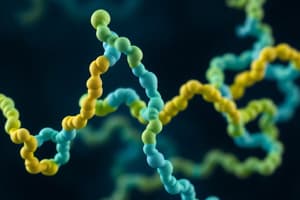Podcast
Questions and Answers
What is the classification of amino acids based on?
What is the classification of amino acids based on?
- Charge
- H bonding ability
- Acidic vs Basic character
- All of the above (correct)
What distinguishes non-polar amino acids?
What distinguishes non-polar amino acids?
They are hydrophobic and have R groups such as alkyl and aromatic.
Name two examples of aromatic side chain amino acids.
Name two examples of aromatic side chain amino acids.
Phenylalanine and Tryptophan.
Acidic side chain amino acids include __________ and __________.
Acidic side chain amino acids include __________ and __________.
Which types of side chains do basic amino acids have?
Which types of side chains do basic amino acids have?
What characterizes neutral side chain amino acids?
What characterizes neutral side chain amino acids?
Hydrophobic amino acids are water loving.
Hydrophobic amino acids are water loving.
Flashcards are hidden until you start studying
Study Notes
Classification of Amino Acids
- Amino acids are categorized based on the characteristics of their R groups.
- Despite diversity, amino acids share fundamental similarities.
Categories of Classification
- Grouped based on:
- Charge (positive, negative, or neutral)
- Hydrogen bonding ability (polar vs. non-polar)
- Acidic versus Basic character
Non-Polar Amino Acids
- Hydrophobic; repel water.
- R groups primarily consist of:
- Alkyl chains
- Aromatic structures
Alkyl Side Chain Amino Acids
- Notable examples include:
- Glycine: behaves like an alkyl group without having one.
- Alanine: contains a methyl group (CH3).
- Valine: characterized by branched alkyl structure (CH(CH3)4).
- Proline: unique cyclic structure (C3H6).
- Methionine: contains a sulfur atom (CH2CH2SCH3).
- Isoleucine: branched alkyl chain (CH(CH3)CH2CH3).
- Leucine: branched structure with isopropyl group (CH3CH(CH3)2).
Aromatic Side Chain Amino Acids
- Notable members:
- Phenylalanine: features a benzyl group (CH2C6H5).
- Tryptophan: includes an indole structure (CH2C8H5NH).
Polar Amino Acids
- Hydrophilic; attracted to water.
- R groups can classify into:
- Neutral groups
- Acidic groups
- Basic groups
Neutral Side Chain Amino Acids
- Key examples include:
- Serine: contains a hydroxyl group (CH2OH).
- Threonine: has a branched hydroxyl structure (CH(OH)CH3).
- Asparagine: features an amide group (CH2CONH2).
- Glutamine: has an extended amide group (CH2CH2CONH2).
- Cysteine: contains a thiol group (CH2SH).
- Tyrosine: contains both hydroxyl and aromatic (CH2C6H4OH).
Acidic Side Chain Amino Acids
- Key members:
- Aspartic Acid: features a carboxyl group (CH2COOH).
- Glutamic Acid: has an extended carboxyl group (CH2CH2COOH).
- The carboxyl group acts as a strong hydrogen donor.
- Their conjugate bases are aspartate and glutamate upon proton donation.
Basic Side Chain Amino Acids
- Include:
- Histidine: contains a nitrogen-rich structure (CH2C3H2N2H).
- Lysine: long straight chain with an amino group (CH2(CH2)3NH2).
- Arginine: characterized by multiple nitrogen atoms in its side chain (CCH2(CH2)3NHCNHNH2).
- Nitrogen atoms make these amino acids strong proton acceptors, giving them basic properties.
Studying That Suits You
Use AI to generate personalized quizzes and flashcards to suit your learning preferences.




